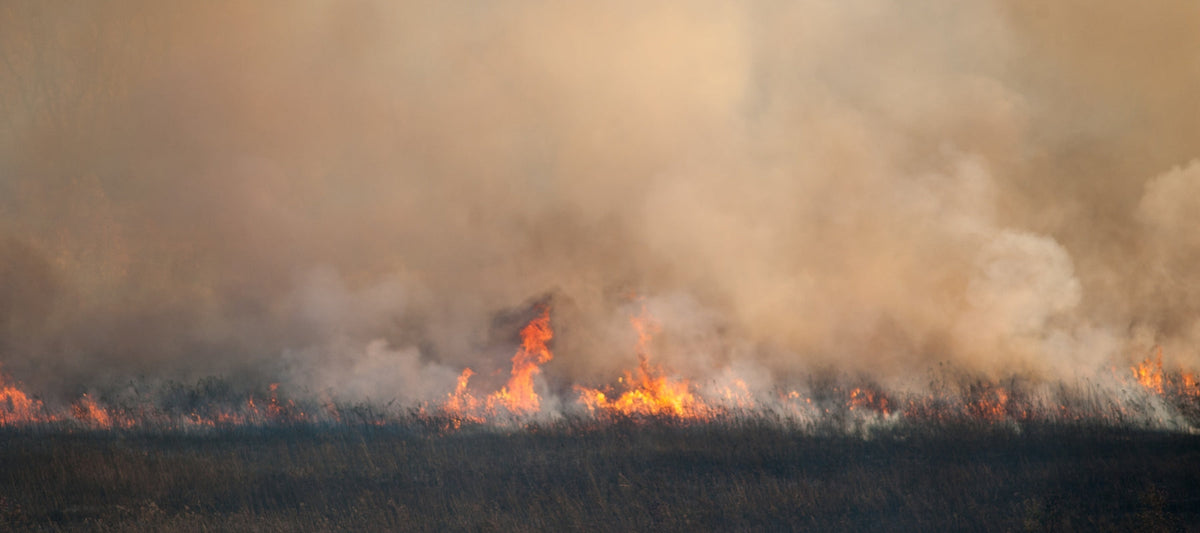
How to Protect Your Skin from Air Pollution
|
Time to read 3 min


|
Time to read 3 min
August in Canada has been unusually hazy this year, and with wildfires and urban pollution on the rise, the air isn’t just affecting our lungs—it’s damaging our skin too. Fine dust particles from air pollution like PM₂.₅ and PM₁₀ are invisible, but their impact on skin health is very real. In this blog, we’ll explain what these particles present in air pollution are, how they harm your skin, and the best ways to keep your skin clear, healthy, and resilient.
Particulate matter (PM) is a mix of microscopic airborne particles that come from wildfires, traffic, industrial emissions, and even household combustion.
PM10 refers to coarse particles 10 micrometers or smaller—about one-seventh the width of a human hair.
PM2.5 includes ultrafine particles only 2.5 micrometers or smaller, small enough to reach deep into the lungs and even enter the bloodstream ( EPA ).
These particles don’t just linger in the air—they settle on your skin’s surface. Over time, they can trigger oxidative stress, weaken your skin barrier, and speed up visible aging, making PM2.5 skincare routines a necessity rather than a luxury.
While we often hear about the dangers of air pollution to our lungs and heart, it’s just as important to understand how it affects our skin.
Long-term exposure to particulate matter is linked to respiratory conditions, cardiovascular disease, and increased mortality rates (World Health Organization ).
Barrier Breakdown: PM₂.₅ generates free radicals that deplete the skin’s natural antioxidants, leading to barrier damage.
Inflammation: Pollutants activate inflammatory pathways, worsening acne, eczema, and sensitivity (Liu et al.).
Accelerated Aging: A study linked pollution exposure to increased wrinkles and hyperpigmentation (Hu et al.).
Heightened Sensitivity: Research has also found that PM₂.₅ exposure is associated with redness and skin irritation, even in healthy individuals (Chou et al.).
This is why pollution-proof skincare is no longer optional—especially if you live in urban areas or regions affected by wildfire smoke.
While you can’t change the air outside, you can strengthen your skin’s defenses. The key is to combine lifestyle adjustments with the right anti-pollution skincare routine.
Invest in a HEPA air purifier to filter out fine dust particles indoors. Keep your windows closed on high-pollution days and avoid burning candles or wood, which can add particulate matter to the air.
Check the Air Quality Index (AQI) before heading outside. Plan outdoor activities for the morning, when pollution levels are typically lower, and consider wearing hats or scarves to limit direct exposure.
A diet rich in antioxidants—like berries, leafy greens, and nuts—can help neutralize free radicals. Stay well-hydrated and get enough sleep so your skin has the resources it needs to repair daily pollution damage.
This is the cornerstone of any PM₂.₅ skincare routine . Pollutants cling to the skin and can settle deep into pores and hair follicles, causing oxidative stress and irritation if not removed.
However, using harsh cleansers or scrubbing aggressively can strip the skin barrier, making it even more vulnerable. Research shows that gentle cleansing is the most effective way to remove pollutants without compromising the skin’s natural defenses ( Kim et al. ).
At DrLOUIE, we designed our Cleansing Duo to remove fine dust and pollutants effectively—while protecting and nourishing the skin barrier.
Uses jojoba esters, a gentle and biodegradable exfoliant, to lift away PM particles and dead skin cells.
Dissolves makeup and impurities with jojoba and grapeseed oils, leaving skin hydrated and smooth.
Gentle enough for daily use, even for sensitive skin prone to pollution-related irritation.
A pH-balanced formula that cleanses deeply without stripping the skin.
Removes residual pollutants while keeping the skin barrier intact and comfortable.
This two-step ritual offers the perfect balance of thorough but gentle cleansing, making it an essential part of any pollution-proof skincare routine.
Air pollution is more than an environmental problem—it’s a daily skin aggressor. PM₂.₅ and PM₁₀ accelerate aging, increase sensitivity, and weaken your skin barrier. But with smart lifestyle choices and a dedicated gentle cleansing routine, you can defend your skin and restore its natural resilience.
Start protecting your skin today with DrLOUIE’s Cleansing Duo —your first and most effective defense against pollution damage.
“Particulate Matter (PM) Basics.” EPA, www.epa.gov/pm-pollution/particulate-matter-pm-basics .
Liu, Wen-Chien, et al. “Skin and Air Pollution.” International Journal of Molecular Sciences, vol. 25, no. 7, 2024, PMC11432173.
Hu, Liang, et al. “Airborne Particulate Matter and Skin Aging.” Scientific Reports, vol. 7, 2017, www.nature.com/articles/s41598-017-15295-8 .
Chou, Yi-Hsuan, et al. “Ambient PM2.5 Exposure and Skin Redness.” PLOS Global Public Health, 2023, journals.plos.org/globalpublichealth/article?id=10.1371/journal.pgph.0000584.
Kim, Beom-Joon, et al. “Effects of Air Pollutants on the Skin.” International Journal of Molecular Sciences, vol. 22, no. 22, 2021, PMC8021104.





